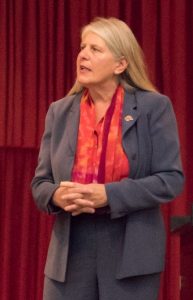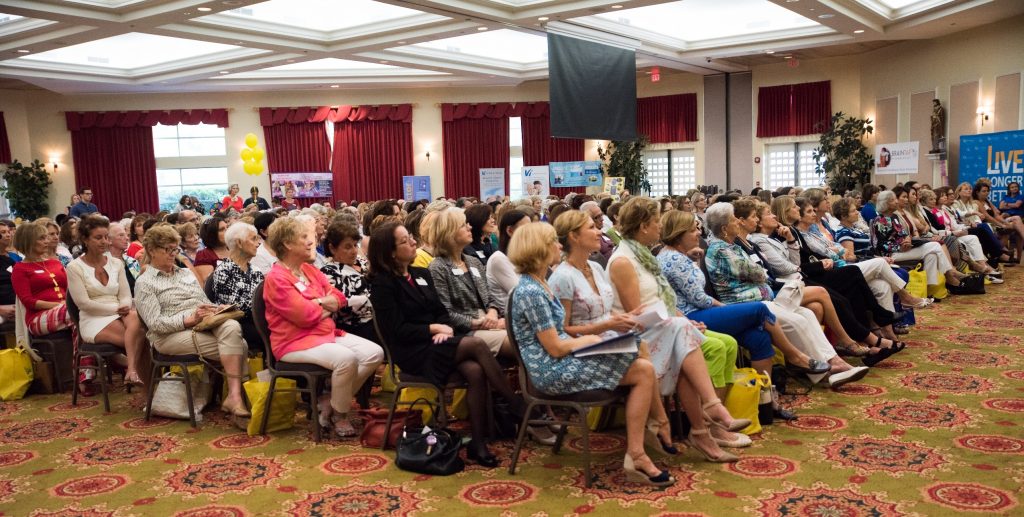CAS News
Kay Anderson Receives Florida Life, Health and Variable Annuity Licenses

Ciccarelli Advisory Services, Inc. is pleased to announce that Kay Anderson has successfully completed the course work and testing needed to acquire her Florida life, health and variable annuity licenses.
Anderson also holds her Series 7 and 66 registrations. She is enrolled in The American College’s Certified Financial Planner® Certification Education program.
Anderson joined Ciccarelli Advisory Services in 2004 and currently serves as an associate planner. She graduated from Florida Gulf Coast University with a Bachelor’s degree in Accounting and a minor in Computer Information Systems.
Ciccarelli Advisory Services has provided family-focused, comprehensive wealth management services to clients across the United States for more than 30 years. Our firm has offices in Naples, FL, and Rochester, NY.
SpelLIFE – A Celebration of our Commitment to Lifelong Wellness

The third annual SpelLIFE Women’s Wellness Summit empowered women in our community to meet like-minded women, interact with local businesses that value lifelong wellness, and gain insight on how to lead richer lives – emotionally, physically and financially.
Gaynell Anderson, owner of Absolute Physical Therapy, co-founded the Women’s Wellness Summit in 2013 with her sister Jill Ciccarelli Rapps, in an effort to provide women in our community with the resources they need to achieve lifelong wellness.
“The mission of SpelLIFE is to motivate women to a pro-active approach to life, using dynamic speakers and valuable community services that center around the eight dimensions of wellness, which SpelLIFE: Spiritual, Physical, Environmental, Leisure, Local, Intellectual, Financial and Emotional,” Anderson said.
The focus of this year’s summit was brain health. Dr. Jill Bolte Taylor, author of the New York Times bestseller “My Stroke of Insight”, delivered the keynote address.
 Her presentation – How to Get Your Brain to Do What You Want it to Do – provided an informative, colorful analysis of how each area of the brain functions.
Her presentation – How to Get Your Brain to Do What You Want it to Do – provided an informative, colorful analysis of how each area of the brain functions.
“The amygdala tells you when you are safe…when you don’t feel safe, it goes ‘Alarm! Alarm! Alert! Alert!’” Dr. Taylor said. “In the present moment your amygdala thinks you are safe. You feel anxious when you worry about the past or the future.”
Dr. Taylor offered concrete recommendations on how to remain in control of your emotions, including what she calls the “90-second rule” – the concept that a thought will trigger an emotional response for only 90 seconds.
“We are not thinking beings who feel; we are feeling beings who think,” she said. “The reason you feel angry for more than 90 seconds at a time is that you stay in a cycle of angry thoughts. Being aware of this gives you the power to be in control.”
The women’s summit also featured five break-out sessions, showcasing experts on a variety of topics related to neurological wellness.
The speakers included Dr. Pamela Gerali, who emphasized the relationship between the human mind and spirit; Dr. William Justiz, who provided insight on diagnosing Alzheimer’s disease; Dr. Pamela Hughes, who outlined the connection between hormones and the brain; and professional organizer Marla Ottenstein, who revealed how peace of mind can be achieved by simplifying your life and getting organized.
One of the break-out sessions focused on helping participants find the purpose in their lives. The presentation was facilitated by several speakers who represented the Blue Zones Project: Lisa Gruenloh, MA, ACC, from Purpose Journey® Consulting, Training and Coaching; Kathy A. Feinstein, MS, from KAF Counseling and Consulting, Inc.; and Dr. Carol Renaud Gaffney from Behavioral Intelligence® Consulting.
In addition, the event featured 27 resource booths, where local businesses interacted with the attendees and demonstrated their commitment to the numerous dimensions of wellness.
Proceeds from the SpelLIFE Women’s Wellness Summit will benefit stroke initiatives at The Brookdale Center for Healthy Aging and Rehabilitation.
The event was sponsored by organizations in our community: Absolute Physical Therapy, the Blue Zones Project by Healthways, Chico’s, Ciccarelli Advisory Services, Ciccarelli Family Foundation, éBella Magazine, Hughes Center for Functional Medicine, Life in Naples Magazine, McKenney Home Care, and the NCH Healthcare System.
This year’s SpelLIFE Women’s Wellness Summit had the largest turnout on record, with more than 340 people in attendance. The event was at 9 a.m. on April 2 at St. John the Evangelist Catholic Church in Naples.
To learn more about next year’s conference – as well as volunteering and sponsorship opportunities – please contact A Euphoric Living Foundation, Inc., at info@spelLIFE.org, or call Jill Ciccarelli Rapps at 239-784-8001.

Gaynell Anderson and Dr. Jill Bolte Taylor are not affiliated with FSC Securities Corporation.
CAS Profiles – Mia Kellman (New York)


Mia joined the CAS team in January 2010. She serves as our office coordinator at the Rochester office – greeting clients with a warm smile when they walk in the door; distributing mail and deliveries; helping Carrie to scan and organize client files; preparing monthly spreadsheets, beneficiary information, and other documents for upcoming client appointments; and ensuring that day-to-day operations run smoothly.
While Mia has a wide range of responsibilities, her favorite part of working at CAS is welcoming and interacting with our clients.
Mia lives in Greece, NY, with her husband Jim, who is a teacher; their two children, Alana and Zachary; and their cat Gracie. Mia said her kids are her world, and she is “so happy to have the privilege to be Mom to these two amazing kids!”
Outside of work, Mia loves spending time with her family – whether it’s baking, roasting marshmallows over the fire pit in their backyard, dining on Mexican food and chocolate, or just visiting on their patio. Mia and her family also like to travel. Their favorite vacation spots are Maine and Hilton Head Island, SC.
In addition, Mia is a landscaping and home decorating enthusiast. She excels at planning parties, showers, and other social functions at her home.
“I love planning all the details that go into a great party,” Mia said. “And seeing people having a good time is priceless!”
Mia also likes to run. She ran two 5Ks last year, and participated in the Dirty Girl Mud Runs – a three-mile jaunt through pure mud, complete with obstacles and costumes!
Mia Kellman is not registered with FSC Securities Corporation or Ciccarelli Advisory Services, Inc.
Tips for Caring For A Loved One
 Jill Ciccarelli Rapps | Life in Naples Magazine | March 2016
Jill Ciccarelli Rapps | Life in Naples Magazine | March 2016
Sometimes life can throw a variety of unexpected events at us. When it does, coping with them in the best way possible is very important. When a circumstance arises that requires us to care for a loved one – whether it’s aging parents or a spouse that has been injured in an accident – it can be extremely challenging. However understanding how to best care for a loved one is important and can help you and those in your life carry on in the best way possible.
What You Should Remember
There are a lot of things that can make this more complex. From your emotions to financial challenges to the simple fact that there never seems to be enough time in a day, caring for a loved one can be one of the most stressful things you have to do. There are some tips that can help you. Here are some of the key things to keep in mind.
- Remember The Love – It can be easy to become so frustrated by the situation that you lose your cool. Remember that the reason you’re providing care is the love you and the person under your care have for one another. The moments you’ve had together often make it all worthwhile and many times just a moment for a hug or another gesture to show how much you love them, can help reduce your stress.
- Find the Positives – Even during the darkest situation, we can train our brain to focus on some glimmers of light. Try to find those flickers of the positive and focus on them. Doing so can help you keep a more positive, upbeat mindset during difficult situations.
- Master Time Management – One of the biggest challenges that you’ll have will be your time. Working, running errands, providing care, and other steps throughout the day all take time. If possible hire help to do the low value activities so that you can spend your time where it is most important. We suggest for families that they spend a majority of their time as quality time with their loved one, laughing, sharing memories, spending time with each other is what matters. If you have the financial wherewithal, hire help to be sure medications are taken, doctor appointments are coordinated, bathing and any other basic necessities are handled. This will give you more energy to share positive moments with the person you are caring for.
- Master Your Finances – Not only will providing care be difficult in terms of time, but it can impact your finances significantly as well. Now more than ever creating a solid budget is a must and so is understanding other steps you can take towards improving the overall financial health you have in place. Pay attention to your finances to ensure that you don’t end up struggling with them later.
- Get Help – There’s nothing to be ashamed of when asking for a little help from someone. There are so many wonderful resources in our community, seek and ask for help and support. Seeking out help during this phase of your life for the person you are caring for and for you, is something that is well worth doing.
- Take Time For “You”– We know we just talked about time management, but there’s also something to be said for just how important it is to take a little time out of the day for yourself. Whether your time is used to go for a quiet walk, watch a movie, go shopping, or just sit on the porch with a glass of wine and unwind for a few, giving yourself some time is absolutely vital for your own mental health.
An Unquestionable Challenge
There’s no question that caring for a loved one can be challenging. The tips above can help you with the process, but it is certainly something that will take effort on your part – physical and mental. Your financial team can help provide guidance during this time that can help you and your loved one in the short and long term. If you have questions, or would like to learn more about this topic, please feel free to contact Ciccarelli Advisory Services.
CAS Profiles – Susan Banta (Florida)

 Susan (aka Susie) has worked in the Naples office for 19 years. She is a registered Paraplanner on Kim Ciccarelli Kantor’s team. She is also a member of the Ciccarelli family as Kim’s step daughter. Susie started her financial services career at Painewebber but was quickly recruited by Kim during a lunch meeting back in 1997.
Susan (aka Susie) has worked in the Naples office for 19 years. She is a registered Paraplanner on Kim Ciccarelli Kantor’s team. She is also a member of the Ciccarelli family as Kim’s step daughter. Susie started her financial services career at Painewebber but was quickly recruited by Kim during a lunch meeting back in 1997.
Susie is originally from Rochester, New York, but has lived in Naples since 1981. She loves to spend time with her family, especially her three grown children: Danielle (who also works in the Naples office), John and Nick. She enjoys playing with her two dogs, Abby and Tasha.
Susie is passionate about her work at CAS. During the time she has been with our company, she has received her Series 7, 6, 24, 51, 63, and Insurance Licenses. She says that there is never a dull moment at Ciccarelli as there is something new to learn every day! When Susie is away from the office she loves to unwind by traveling, camping and reading (her favorite author is James Patterson). If not working in finance, she would be traveling around the country, camping wherever possible. Among her many talents are baking and cooking; her strawberry jam is legendary!
Four Advisors Earn Accolades in 2016 Distinctive Women Magazine

Distinctive Women magazine has recognized the dynamic leadership and passion of four advisors from Ciccarelli Advisory Services, Inc.: Kim Ciccarelli Kantor, CFP® CAP™; Jill Ciccarelli Rapps, CAP™; Lynn A. Ferraina; and Carol L. Girvin.
Distinctive Women showcased the family-focused wealth management approach championed by the Ciccarelli team, with an emphasis on the advisors’ commitment to promoting a strong financial future for their clients.
“We help our clients select financial choices by uniting facts and asking the right questions,” said Kim Ciccarelli Kantor. “We learn about family values, what they’ve accomplished and what means the most to them.”
Communication with clients and their families is integral to Ciccarelli’s wealth management approach. By organizing each client’s affairs in a way that the whole family can understand, the advisors have kept generation after generation returning for financial advice – particularly women.
“Women are so comfortable at multi-tasking and taking care of others,” said Jill Ciccarelli Rapps. “We combine our knowledge and experience to help women build financial plans that support what is key in their lives.”
Ciccarelli Advisory Services is a family-owned and operated wealth management firm. With offices in Naples, FL, and Rochester, NY, the firm is committed to providing comprehensive financial planning and investment management to communities nationwide.
Third-party rankings and recognitions are no guarantee of future investment success and do not ensure that a client or prospective client will experience a higher level of performance or results. These ratings should not be construed as an endorsement of the advisor by any client nor are they representative of any one client’s evaluation.
Preserving Your Digital Estate

In recent years, a new category of assets has appeared on the scene, which can be more complicated to pass on at someone’s death than stocks, bonds and cash. The list includes such valuable property as digital domain names, social media accounts, websites and blogs that you manage, and pretty much anything stored on the cloud.
In addition, if you were to die tomorrow, would your heirs know the passcodes to access your iPad or smartphone? Or, for that matter, your email account or the Amazon.com or iTunes shopping accounts you’ve set up? Would they know how to shut down your Facebook account, or would it live on after your death?
A service called Everplans has created a listing of these and other digital assets that you might consider in your estate plan, and recommends that you share your logins and passwords with a digital executor or heirs. If the account or asset has value (airline miles or hotel rewards programs, domain names) these should be transferred to specific heirs—and you can include these bequests in your will. Other assets should probably be shut down or discontinued, which means your digital executor should probably be a detail-oriented person with some technical familiarity.
The site also provides a guide to how to shut down accounts; click on “F,” select “Facebook,” and you’re taken to a site (https://www.everplans.com/articles/how-to-close-a-facebook-account-when-someone-dies) which tells you how to deactivate or delete the account. Note that each option requires the digital executor to be able to log into the site first; otherwise that person would have to submit your birth and death certificates and proof of authority under local law that he/she is your lawful representative. (The executor can also “memorialize” your account, which means freezing it from outside participation.)
The point here is that even if you know who’s would get your house and retirement assets if you were hit by a bus tomorrow, you could still be leaving a mess to your heirs unless you clean up your digital assets as well.
Sources: https://www.everplans.com/articles/a-helpful-overview-of-all-your-digital-property-and-digital-assets
https://www.everplans.com/articles/how-to-close-online-accounts-and-services-when-someone-dies
https://www.everplans.com/articles/digital-cheat-sheet-how-to-create-a-digital-estate-plan
Estate Tax Complexities

Years ago, the way to most efficiently save on estate taxes was to set up credit shelter trusts that would pour assets from one spouse to another when death occurred, so that both spouses would get the maximum estate tax exemption. In those simpler days, people who didn’t have to pay estate taxes didn’t have to file an estate tax return.
Today, we live in a very different world. No longer is a credit shelter trust necessary; the surviving spouse gets to keep the unused portion of the deceased spouse’s estate tax exemption regardless of who owns which assets at the time of death. And with the exemption up to $5.43 million per spouse, you would think that fewer people would have to file estate tax returns.
This last assumption would be wrong. In order to claim the portable exemption of the deceased spouse, the estate has to file Estate Tax Form 706 on behalf of the survivor. This form can be complicated; it requires the executor to report the value of the assets that don’t need to be reported for tax purposes, and to subtract that amount from the exemption—in order to calculate the exemption amount that the survivor can keep and use when he or she dies and passes on assets to heirs. So you still have to do an estate valuation.
If you know for sure that your future estate won’t exceed $5.43 million indexed for inflation, then there is no need to file an estate tax return. But when people factor in the (hopefully) appreciating value of their house, in addition to their retirement assets over the years they expect to live, a surprising number of people should opt to file the tax form.
There’s one other complication: although the surviving spouse’s exemption will keep rising with inflation, the portable amount stays fixed until it’s eventually used.
And one more: people who die with assets in their name get a step-up in cost basis on their investments—which basically means that the capital gains taxes that would otherwise be owed when those investments are sold will go away. So although it no longer matters, from an estate tax perspective, who owns which assets, it is beneficial for the deceased spouse to own assets that have a low cost basis—things like a home purchased many years ago, or stocks acquired before a large runup in value, or shares of a small business that started with zero value. But beware transfers on a spouse’s deathbed; if the deceased dies less than a year after the transfer, the tax code treats it as if the transfer were never made.
What? You expected the government to simplify your estate taxes?
Sources: http://www.bna.com/portability-regulations-offer-b12884910119/
http://www.forbes.com/sites/lewissaret/2014/01/07/estate-tax-portability-computing-the-dsue-amount/#ab866a57f1bc
Although the information has been gathered from sources believed to be reliable, it cannot be guaranteed. Federal tax laws are complex and subject to change. This information is not intended to be a substitute for specific individualized tax or legal advice. FSC Securities Corp. does not offer tax or legal advice. As with all matters of a tax or legal nature, you should consult with your tax or legal counsel for advice.
Perspective on Financial Security

Chances are, you know that it takes steady savings to accumulate wealth. A recent article in Business Insider actually calculated how much you’d have to invest each day in order to become a millionaire.
Suppose your investments earn an average 7% yearly return, and you want to have $1 million by the age of 65. At age 20, you’d have to invest just $9 a day to achieve your goal—which really makes you rethink the cost of a cappuccino grande and a bagel at Starbucks every morning (typically over $10). If you start at age 25, then 12 dollars a day would do the trick. At age 30, your required daily investment goes up to $18, and it stays manageable even at age 35: $27 a day.
Of course, the longer you wait, the more you’re going to have to save. At age 55, your required investment has risen to $189 a day. If you’ve waited that long, let’s hope you have an enormous income to help you catch up.
Source: http://www.businessinsider.com/save-this-much-to-become-a-millionaire-by-age-65-2016-2
Wisdom After A Major Life Transition
J ill Ciccarelli Rapps | Life in Naples Magazine | February 2016
ill Ciccarelli Rapps | Life in Naples Magazine | February 2016
As you live and go through your life, things will inevitably change. It’s a simple fact of the universe that your situation, thoughts, and life in general will evolve. Sometimes it’s for the better, sometimes for the worse, but no matter what the specific situation is it’s important that you approach the days and years after a major life transition with wisdom.
MAJOR TRANSITIONS
What do we mean when we say a major life transition, exactly? This can refer to any number of things – good and bad – and a few examples include:
Marriage | Birth of a child | Death of a loved one | Divorce | Career change | Move | Lottery win | Inheritance
In general, anything that changes your life in a significant way in terms of your relationships, your finances, or your outlook could be considered a major life transition. And when that change comes, it will create a ripple effect that will impact almost every other aspect of your life. Approaching it with wisdom and understanding is a must.
KEYS TO REMEMBER
Here are a few things that you should keep in mind following a major life transition. They can help ensure that you are able to move through it with grace and wisdom and take yourself to a better place in the future:
- Before you make any major actions or decisions, start off by simply looking at the big picture – each side of the transition. There are likely pros and cons to everything, and even something as seemingly negative like a divorce could have something hidden within it to look forward to. Try to approach each transition as a fresh start for your life and that begins with taking a good, long look at it.
- Consider exactly how the event is going to impact you in the long term and think about how you can impact it. Think about past experiences, what has led you to where you are, and how you may be able to influence the current situation as well as future ones? Understanding that you are in control of your life can help you take a better approach to dealing with any transitional period.
- Don’t take rash steps that are based solely on the ‘now’. You may feel overwhelmed and be in a high emotional state. This usually is not the best time to make major decisions. If possible, work on getting to a better place emotionally first, and unless you absolutely have to make a decision, take your time. You will be thankful when you have more clarity and feel better about the choices you make. You should try to approach things while looking at the way they’ll impact your life throughout the future instead of just thinking about the few days directly after a transition occurs.
- Learn from everything that happens. Treat each life experience as though it is a lesson to learn from and try to use the knowledge you gather over your lifetime to inform your decisions and actions in the future. This can apply to anything and keeping the right mindset is important.
- Stay positive. Even when things seem to be going badly, try to find the things in life that mean something to you and focus on them as you navigate the days and weeks after a major transition. If you’ll stay focused on the positive, it’s easier to stay motivated and to make the most of your life after a significant event occurs.
CARRYING ON
Life can be unpredictable at times and it’s important that you know how to move through new events in the best possible way. The tips above can help you move through major life transitions with wisdom and are well worth remembering no matter what the circumstances might be.
Your advisor can help you do just that. Getting a clearer picture of your finances and your future is a must, so don’t hesitate to contact us today to get the guidance you deserve no matter what life has thrown your way.

